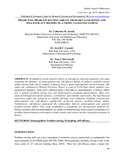PREDICTING PROBLEM SOLVING ABILITY FROM METACOGNITION AND SELF-EFFICACY BELIEFS ON A CROSS VALIDATED SAMPLE
Abstract
Grounded in social cognitive theory of self-efficacy and self-regulation, this study
examined the influence of metacognition and self-efficacy beliefs on genetics problem solving
ability among high school students in Kenya using a quasi-experimental research design. The
study was conducted in Western Province, Kenya. A total of 2,138 high school students were
purposively sampled. Data were collected using a Self-efficacy questionnaire, a biology ability
test, a genetics problem solving test, and metacognitive prompting questionnaire. Data were
analyzed through descriptive statistics, correlations, and multiple regressions. The hypothesized
regression model was tested for its stability through cross-validation. Findings revealed that
metacognition and self-efficacy significantly predicted genetics problem-solving ability.
Furthermore, self-efficacy moderated the relationship between metacognition and genetics
problem-solving ability. This study established a foundation for instructional methods for
biology teachers and recommendations are made for implementing metacognitive prompting in a
problem-based learning environment in high schools and science teacher education programs in
Kenya.
Collections
- Journal Articles [411]

